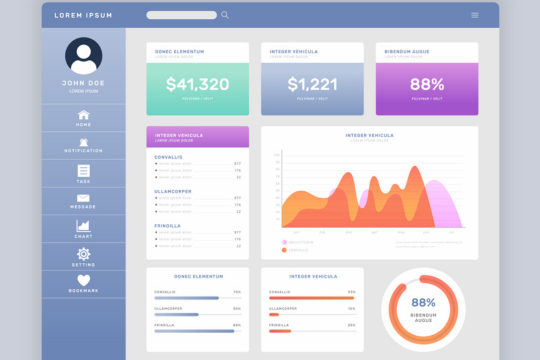Which Web Platform is Best Suited for Your Business in 2025?
Selecting the correct website platformis perhaps one of the most critical decisions for any business looking to thrive online in 2025. There are so many platforms with distinctive features that picking the one that best supports your business objectives, technical ability, and budget is fundamental. In this guide, we will review the best website platformsin 2025 and assist you in ascertaining the most suitable one for your own business requirements.
Table of contents [Show]
- 1 Why Your Website Platform Is Important in 2025
- 1. 1 Best Website Platforms to Choose in 2025
- 1. 1. 1 1. WordPress (Self-hosted) Ideal for: Content-based businesses, blogs, and customization flexibility.
- 1. 1. 2 2. Shopify Ideal for: eCommerce businesses, dropshipping, and online stores.
- 1. 1. 3 3. Wix Best for: Freelancers, small businesses, creative professionals.
- 1. 1. 4 4. Squarespace Ideal for: Creative businesses, portfolios, photographers, and service providers.
- 1. 1. 5 5. Webflow Best for: Designers, developers, and companies that require advanced customization.
- 1. 2 Key Factors to Consider When Choosing a Website Platform
- 1. 3 Website Platform Trends in 2025
- 1. 4 Final Thoughts:
- 1. 1 Best Website Platforms to Choose in 2025
Why Your Website Platform Is Important in 2025
A website is not only a virtual business card—it's your 24/7 store, customer service counter, and brand representative. Your platform choice will affect on:
- Website performance and speed
- SEO and search engine visibility
- Scalability and customization
- Mobile-friendliness
- Security and data privacy
- Third-party tool integration
With advancing technology and changing customer expectations, your business website should remain competitive and easy to use. That's why the evaluation of platforms in 2025 calls for a forward-thinking approach.

Best Website Platforms to Choose in 2025
1. WordPress (Self-hosted)
Ideal for: Content-based businesses, blogs, and customization flexibility.
WordPress is still the world's top CMS in 2025, with over 40% of the internet under its belt. It features thousands of plugins, themes, and full control over customizations.
Pros:
- Open-source and very customizable
- Large support and developer community
- SEO-optimized with plugins such as Yoast or Rank Math
- Scales from small blogs to big enterprise websites
Cons:
- Needs ongoing security monitoring and updates
- Needs technical setup and hosting
2. Shopify
Ideal for: eCommerce businesses, dropshipping, and online stores.
Shopify is among the most excellent website platformsfor eCommerce businesses in 2025. It has an excellent, easy-to-use platform with in-built payment processing and product management capabilities.
Pros:
- Easy and fast setup
- Secure and stable hosting
- SEO and mobile optimization included
- App store with marketing tools, inventory, etc.
Cons:
- Monthly subscription fees
- Limited design flexibility due to open-source platforms
3. Wix
Best for: Freelancers, small businesses, creative professionals.
Wix is famous for its drag-and-drop builder, which makes it perfect for users with no coding knowledge. In 2025, Wix has further enhanced its AI functionality and design automation.
Pros:
- Simple-to-use website builder
- Pre-made templates for different industries
- Built-in marketing and SEO tools
- Fast publishing and updates
Cons:
- Limited scalability for big businesses
- Can be costly with extra features
4. Squarespace
Ideal for: Creative businesses, portfolios, photographers, and service providers.
Squarespace excels in design and looks. With clean templates and responsive layouts, it's a favorite among branding-driven businesses in 2025.
Pros:
- Stunning templates with all-device optimization
- Integrated blogging and eCommerce functionalities
- All-in-one solution (hosting + design)
- Perfect for visually oriented businesses
Cons:
- Less accommodating for intricate customizations
- No free tier
5. Webflow
Best for: Designers, developers, and companies that require advanced customization.
Webflow is a robust platform that unites visual design and development agility. It's perfect for brands that desire performance and design without compromising control.
Advantages:
- Custom animations and responsive design
- Clean, production-ready code
- Integrated CMS and SEO features
- High-performance hosting
Disadvantages:
- Steep learning curve for non-tech users
- More expensive than traditional builders
Key Factors to Consider When Choosing a Website Platform
1. Business Goals and Use Case
Are you opening an online shop, presenting a portfolio, or blogging? Pair your platform to your goal. For instance:
- E-commerce: Shopify or WooCommerce (with WordPress)
- Blog/Content site: WordPress or Squarespace
- Portfolio: Wix, Webflow, or Squarespace
2. Budget and Pricing Model
Each platform has various pricing models: free versions, monthly subscriptions, transaction charges, or hosting fees. Consider:
- Startup budget vs. long-term costs
- Hidden charges, such as plugins or custom themes
- Hosting and domain fees
3. Technical Skills and Support
Consider the following questions:
- Do I possess coding skills?
- Will I require a developer?
- How crucial is 24/7 support?
Wix and Shopify are wonderful for beginners. WordPress and Webflow provide more freedom but need technical knowledge.
4. SEO Capabilities
Google ranking is a must in 2025. Your platform must accommodate:
- Custom meta tags and titles
- Quick page loading
- Mobile-friendly responsiveness
- Structured data support
- SEO plugin compatibility
WordPress, Webflow, and Shopify are best at SEO, followed closely by Wix and Squarespace.
5. Integration and Scalability
Select a platform that expands with your business. Search for integrations with:
- CRM applications (such as HubSpot or Zoho)
- Email marketing (Mailchimp, ConvertKit)
- Analytics (Google Analytics 4)
- Payment gateways
Shopify and WordPress are best at integrations, with Webflow and Wix providing moderate flexibility.
Website Platform Trends in 2025
AI-Powered Website Builders
- Tools such as Wix and Shopify now employ AI tools for content generation, proposing designs, and SEO optimization.
No-Code/Low-Code Web Development
- Webflow, Bubble, and similar tools give users the power to develop sophisticated websites without extensive programming experience.
Performance and Speed Optimization
- With Google's Core Web Vitals impacting search rankings, the platforms now emphasize quicker load times, image compression, and mobile-first design.
Advanced Security Features
SSL certificates, firewalls, and auto-updates are the norm. Shopify, WordPress (with plugins), and Squarespace make security a top priority in 2025.

Final Thoughts:
The ideal website platformfor your company in 2025 will rely on your unique requirements, objectives, and available resources. Shopify is the industry leader in e-commerce, but WordPress is still the most adaptable and scalable platform. Webflow works well for creative, design-focused firms, while Wix and Squarespace are great for fast, eye-catching websites. Examine platforms according to your team's capabilities, long-term goals, and business type before choosing one. A carefully considered platform may boost your visibility, save you time, and spur growth for years to come.
Leave a comment
Your email address will not be published. Required fields are marked *
